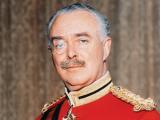The Prostitution Reform Act was passed on a tumultuous night in Parliament, with the public galleries filled with supporters from both sides.
Government
Events In History
In 1972 legislation established the Accident Compensation Commission (ACC) to provide insurance for all personal injury.
Sir Guy Powles was New Zealand's first Ombudsman. In a loose translation from Swedish, the word means ‘grievance person’. The office was created to investigate complaints about government departments and other national public sector organisations.
The 1935 general election has long been seen a defining moment in New Zealand history. Undermined by its failure to cope with the distress of the Depression, the Coalition (‘National’) government was routed by the Labour Party, led by Michael Joseph Savage.
Articles
The House of Representatives

New Zealand's Parliament dates back to 1854, just 14 years after the signing of the Treaty of Waitangi and the beginning of the European settlement of the country. For most of its history as a nation state, New Zealand has had some form of elected government. Read the full article
Page 1 - The House of Representatives
New Zealand's Parliament dates back to 1854, just 14 years after the signing of the Treaty of Waitangi and the beginning of the European settlement of the country. For most of its
Links - government

Recommended links for the study of New Zealand politics and government Read the full article
Page 1 - Government and political history links
Recommended links for the study of New Zealand politics and
History of the Governor-General

New Zealand has had a governor or (from 1917) a governor-general since 1840. The work of these men and women has reflected the constitutional and political history of New Zealand in many ways. Read the full article
Page 2 - Modern duties
The governor-general's duties are divided into three functions: ceremonial, community and
Page 4 - Responsible government
From the 1840s settlers demanded a say in government. Governor George Grey suspended an overly elaborate constitution in 1846, but the New Zealand Constitution Act 1852 gave male
Page 5 - Splendid ornamentals
With the appointment of Lord Onslow in 1889, a new type of governor took up residence in Government
The Treaty in brief
The Treaty of Waitangi is New Zealand’s founding document. It takes its name from the place in the Bay of Islands where it was first signed, on 6 February 1840. The Treaty is an agreement, in Māori and English, that was made between the British Crown and about 540 Māori rangatira (chiefs). Read the full article
Page 1 - The Treaty in brief
The Treaty of Waitangi is New Zealand’s founding document. It takes its name from the place in the Bay of Islands where it was first signed, on 6 February 1840. The Treaty is an
Premiers and Prime Ministers
From Henry Sewell in 1856 to Chris Hipkins in 2023, New Zealand has had 41 prime ministers and premiers. Read biographies of the men and women who have held the top job, discover more about the role's political origins, and explore fascinating prime ministerial facts and trivia. Read the full article
Page 2 - Political origins
Overview of the influence of the British political system in New Zealand and our move toward self-government in the 19th
Queen Elizabeth II

Queen Elizabeth II became New Zealand's monarch on 6 February 1952, following the death of her father, King George VI Read the full article
Page 2 - Constitutional and public ceremonial roles
The Queen was New Zealand’s head of state. Her title was confirmed by Royal Titles Acts of 1953 and 1974, the latter entitling her ‘Elizabeth the Second, by the Grace of God Queen
The New Zealand Legion
The year 1933 witnessed an unprecedented eruption of protest amongst urban businessmen and professionals in New Zealand. The most prominent manifestation of this protest was a radical conservative movement named the New Zealand Legion. Read the full article
Page 5 - Ideology
While the New Zealand Legion’s initial policy was deliberately vague, it contained several key elements that were central to the movement’s ideology throughout its













